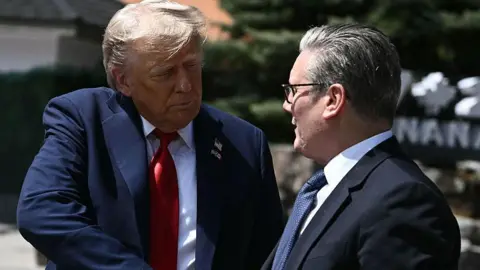In a significant political and economic development, US President Donald Trump has recently formalized a reduction in tariffs specifically targeting British automobiles. This action, taken during the Group of Seven (G7) summit held in Canada on June 16, 2025, has reignited discussions about international trade and diplomatic relations between the United States and the United Kingdom. Trump’s signing of documents aimed at lowering these tariffs represents a critical component of a broader tariff agreement that has been in negotiation between the two nations, further illustrating the ongoing evolution of trade policies in a rapidly changing global marketplace.
At the summit, British Prime Minister Sir Keir Starmer underscored the momentous nature of this policy shift, labeling it as “a very important day” for the bilateral relations between the UK and the US. The reduction in tariffs on UK vehicles is seen as a pivotal step in fostering economic cooperation and strengthening trade ties post-Brexit. This pact marks the first significant trade arrangement that the White House has announced since imposing tariffs on various imports early in the year. Thus, it serves as a strategic maneuver to re-engage the UK within the American trade sphere after the implications of Brexit changed the landscape of UK-EU and UK-US trade dynamics.
However, while the reduction of tariffs on British cars is a welcomed development, a 10% duty persists on a variety of other goods from Britain entering the US market. This continuation of levies on most goods underscores some of the complexities and challenges involved in reaching a comprehensive and mutually beneficial trade agreement. Analysts observe that while lowering tariffs on UK automobiles could benefit manufacturers and exporters in the UK, particularly within the automotive sector, the remaining tariffs will pose challenges for other industries hoping to export to the US.
The tariff agreement has attracted attention not just for its economic implications but for its potential political ramifications as well. Traditionally, the UK has been one of the closest allies of the United States, and changes in trade policy can often reflect broader geopolitical strategies. As the global landscape shifts, especially with the UK navigating its new position outside the EU, maintaining strong trade links with the US has become increasingly important for the British government. The tariff reduction, therefore, is not only an economic issue but also a reflection of strategic international relations.
This announcement at the G7 summit denotes a pivotal moment for both nations, as it could pave the way for future negotiations regarding trade agreements and economic partnerships. Building upon this reduction, both countries might look to enhance their discussions on various other sectors, potentially leading to expanded trade negotiations that cover a wider array of goods and services. Ultimately, such efforts could foster a deeper and more resilient economic partnership between the two countries, enhancing mutual benefits in an era where global trade relationships are more scrutinized and contentious than ever.
With President Trump leading this charge and Prime Minister Starmer backing it, the move towards reducing tariffs is likely to set the stage for further talks between the two nations. From the perspective of industries reliant on exports, this shift could lead to a boost in competitiveness and market options. In conclusion, while the immediate reduction of tariffs on certain goods marks an important step, the ongoing challenges presented by remaining levies ensure that the discourse on UK-US trade will continue to evolve in the coming months and years, with the potential for significant implications on both sides of the Atlantic.



